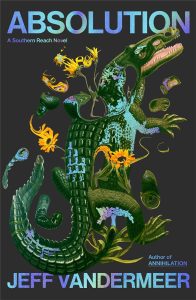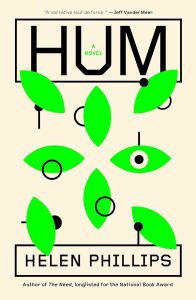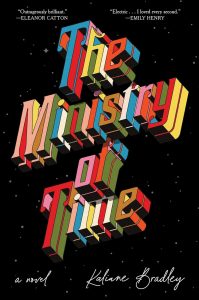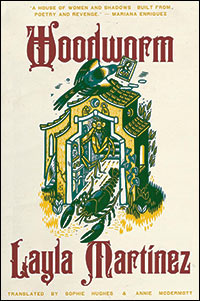The Year in Review 2024 by Abigail Nussbaum

In the summer of 2024, Briardene Books published Track Changes, a collection of my reviews. There’s nothing like putting a book like that together, combing your way through nearly 20 years of work, to make you think about the project of canon-building. What books still deserve to be talked about decades after you read them? What books represent shifts in the field, or in literature itself, that you were maybe too close to at the time to even realize were happening?
All of which makes the project of summing up a year in the science fiction, fantasy, and horror genres something of a daunting project. You can be an extremely voracious, eclectic reader and still only see your bit of the elephant. Whole subgenres, movements, and emerging preoccupations will have passed you by, or will become obvious only with some years’ hindsight.
With that caveat in mind, 2024 feels like a quiet year in genre publishing. In part this is simply a matter of being overshadowed by 2023, a year in which not one but two novel debuts took the field by storm, splitting its major awards between them, while a raft of no less exciting work populated the nomination ballots and other awards. It’s a testament to how top-heavy 2023 was that two of its most exciting offerings – Martin MacInnes’s In Ascension, a sort of Contact for the 21st century which won the Arthur C. Clarke Award, and Francis Spufford’s Cahokia Jazz, a thrilling alternate history in which Native Americans remain a vital geopolitical force, only received their US publications in 2024.
 Even allowing for that overshadowing effect, however, 2024 seems to lack a gravitational center, those big, buzzy books that the entire field raves over. Even some of the year’s most anticipated releases have been a little too idiosyncratic to claim center stage. Jeff VanderMeer returned to the world of his Area X trilogy with Absolution, a novel that is no less oblique and puzzling than its predecessors, and which rather than put a cap on that era-defining work, only opened more questions about it. Kelly Link published a novel, The Book of Love, after a quarter century as one of America’s premier writers of short fiction, and it is delightful – but also baggy, discursive, and meandering. And after nearly a decade of writing non-fiction and criticism, Sofia Samatar returned with the novella The Practice, the Horizon, and the Chain, a wrenching look at entrenched social stratification and the cost of breaking it, that still felt more like a taste than a whole meal.
Even allowing for that overshadowing effect, however, 2024 seems to lack a gravitational center, those big, buzzy books that the entire field raves over. Even some of the year’s most anticipated releases have been a little too idiosyncratic to claim center stage. Jeff VanderMeer returned to the world of his Area X trilogy with Absolution, a novel that is no less oblique and puzzling than its predecessors, and which rather than put a cap on that era-defining work, only opened more questions about it. Kelly Link published a novel, The Book of Love, after a quarter century as one of America’s premier writers of short fiction, and it is delightful – but also baggy, discursive, and meandering. And after nearly a decade of writing non-fiction and criticism, Sofia Samatar returned with the novella The Practice, the Horizon, and the Chain, a wrenching look at entrenched social stratification and the cost of breaking it, that still felt more like a taste than a whole meal.
If there isn’t a single (or a few) books to rally around, what we see instead in 2024 are some converging preoccupations. ‘‘Cod-Victorian lady scientists in fantasyland’’ continues to be a popular story-form, for example, with Malka Older’s Mossa and Pleiti, and Heather Fawcett’s Emily Wilde, embarking on new adventures. A less heralded, but to my mind more exciting, entry in this mode was Sylvie Cathrall’s A Letter to the Luminous Deep, in which a society of academics and scientists explores the depths, and shadowy history, of a water planet. When two aspiring naturalists forge an epistolary friendship and then disappear, their siblings join forces to piece together their correspondence, revealing a society that is both dedicated to the pursuit of knowledge and hobbled by department politics, and a love story between two lonely, damaged people. Somewhat in the same mode is Sarah Brooks’s The Cautious Traveller’s Guide to the Wastelands, in which a train company promises both safety and luxury to travelers making their way across a transformed, and transforming, space – a promise that is, inevitably, broken. The result crosses Murder on the Orient Express with VanderMeer’s Area X, to delightful effect.
 Brooks’s novel is notable, as well, for having been published by a mainstream publisher and aimed at a crossover audience. This, too, seems to have been a growing trend in 2024. Novels like Marie-Helene Bertino’s Beautyland and Emet North’s In Universes are the sort of thing we’ve come to expect from literary science fiction: finely crafted, closely observed character pieces that use a core SFnal trope – respectively, aliens and alternate universes – to reflect on the loneliness and emotional struggles of their protagonists. Alongside this sort of work, however, it increasingly feels as if it is mainstream and crossover publishers who are more interested in using the tools of the fantastic to comment on the pressing issues of the day: the intersection of climate change and inequality (The Shutouts by Gabrielle Korn; Hum by Helen Phillips); the escape fantasies of the rich and powerful (Glass Houses by Madeline Ashby; A Better World by Sarah Langan); the impact of the pandemic (Pink Slime by Fernanda Trías; Sleepaway by Kevin Prufer).
Brooks’s novel is notable, as well, for having been published by a mainstream publisher and aimed at a crossover audience. This, too, seems to have been a growing trend in 2024. Novels like Marie-Helene Bertino’s Beautyland and Emet North’s In Universes are the sort of thing we’ve come to expect from literary science fiction: finely crafted, closely observed character pieces that use a core SFnal trope – respectively, aliens and alternate universes – to reflect on the loneliness and emotional struggles of their protagonists. Alongside this sort of work, however, it increasingly feels as if it is mainstream and crossover publishers who are more interested in using the tools of the fantastic to comment on the pressing issues of the day: the intersection of climate change and inequality (The Shutouts by Gabrielle Korn; Hum by Helen Phillips); the escape fantasies of the rich and powerful (Glass Houses by Madeline Ashby; A Better World by Sarah Langan); the impact of the pandemic (Pink Slime by Fernanda Trías; Sleepaway by Kevin Prufer).
 The absolute standout amongst these books is Julia Armfield’s Private Rites, which is at once a pitch-perfect climate catastrophe and a gloriously dysfunctional family drama, and which persuasively argues that, like the three squabbling sisters at the novel’s center, we too are distracting ourselves with petty disputes to keep from noticing the end of the world. One wonders, however, why mainstream audiences were assumed to be more congenial to this message than fans of the genre supposedly concerned with the shape of the looming future.
The absolute standout amongst these books is Julia Armfield’s Private Rites, which is at once a pitch-perfect climate catastrophe and a gloriously dysfunctional family drama, and which persuasively argues that, like the three squabbling sisters at the novel’s center, we too are distracting ourselves with petty disputes to keep from noticing the end of the world. One wonders, however, why mainstream audiences were assumed to be more congenial to this message than fans of the genre supposedly concerned with the shape of the looming future.
Sometimes, however, the answer is simply a matter of what sells. If romantasy has been the hot new thing in genre publishing, mainstream publishers have started producing what I have come to think of as ‘‘elevated romantasy.’’ I picked up Kaliane Bradley’s The Ministry of Time, in which a nameless narrator is assigned to be the liaison to a 19th-century polar explorer plucked from the doomed Franklin expedition, expecting a disposable romp. Instead I found a careful consideration of things like Britain’s ‘‘hostile environment’’ policy, or the hollowness of official paeans to diversity, alongside a complicated, often hard-to-root-for romance. Somewhat overshadowed by Bradley’s juggernaut of a novel, but no less crunchy, is Holly Gramazio’s The Husbands, in which a woman gets a new husband every time she sends the old one into her crawlspace. Gramazio makes much of her premise’s comedic potential, but her real concern is how the seeming infinity of choices can warp her heroine’s perceptions, and make it impossible for her to find, not The One, but a good life.
 It would probably be premature to call it a considered response, but it’s interesting that in the same year in which mainstream publishers have delivered so many books with core SFnal premises, genre publishers have put out several offerings that might best be termed ‘‘fantasy without fantasy.’’ Premee Mohamed’s wrenching The Siege of Burning Grass is set in a world riven by war, where a dedicated pacifist is suborned by the leadership of his society, which has made endless warfare its guiding principle. But aside from its world being an invented one, there is little that is magical, supernatural, or speculative about the novel. It is fantasy simply because that gives Mohamed the scope to talk about what her protagonist’s commitment to pacifism ends up demanding from him.
It would probably be premature to call it a considered response, but it’s interesting that in the same year in which mainstream publishers have delivered so many books with core SFnal premises, genre publishers have put out several offerings that might best be termed ‘‘fantasy without fantasy.’’ Premee Mohamed’s wrenching The Siege of Burning Grass is set in a world riven by war, where a dedicated pacifist is suborned by the leadership of his society, which has made endless warfare its guiding principle. But aside from its world being an invented one, there is little that is magical, supernatural, or speculative about the novel. It is fantasy simply because that gives Mohamed the scope to talk about what her protagonist’s commitment to pacifism ends up demanding from him.
Alex Jeffers’s A Mourning Coat similarly tells a wholly naturalistic story, about a man coming back to life after years of caring for his ailing father, that is set in a wholly fantasized world, balancing these two aspects perfectly. And in Gautam Bhatia’s The Sentence, the core fantastical conceit is a successful revolution that has granted equal power to the people as the elites, with an order of lawyers who stand between them to keep the scales balanced. It’s an interesting approach to the fantastic genres, and I am curious to see if other authors imitate it.
 Of course, at some point the impulse to identify trends breaks down. There are books that stood out for me this year that can’t be slotted into any growing subgenre, or marketing scheme, or real-world preoccupation: Aliya Whiteley’s hard-to-categorize Three Eight One, part parable, part formal experiment, part gonzo worldbuilding exercise. Ursula Whitcher’s North Continent Ribbon, a perfectly crafted mosaic novel about a world whose mannered norms only barely conceal the cyberpunk dystopia at its core. Layla Martinez’s Woodworm, in which Mexican social realism meets Gothic horror. Yeji Y. Ham’s The Invisible Hotel, a coming of age tale that is also a horror story about the lingering weight of the Korean war. If these books, too, belong to burgeoning streams within genre writing, they are ones that I have yet to identify. As ever, the real measure of 2024 in genre publishing will only be truly discernible from years or even decades down the line. In the meantime, we can enjoy it the way we do every year: for having given us some excellent new books to read.
Of course, at some point the impulse to identify trends breaks down. There are books that stood out for me this year that can’t be slotted into any growing subgenre, or marketing scheme, or real-world preoccupation: Aliya Whiteley’s hard-to-categorize Three Eight One, part parable, part formal experiment, part gonzo worldbuilding exercise. Ursula Whitcher’s North Continent Ribbon, a perfectly crafted mosaic novel about a world whose mannered norms only barely conceal the cyberpunk dystopia at its core. Layla Martinez’s Woodworm, in which Mexican social realism meets Gothic horror. Yeji Y. Ham’s The Invisible Hotel, a coming of age tale that is also a horror story about the lingering weight of the Korean war. If these books, too, belong to burgeoning streams within genre writing, they are ones that I have yet to identify. As ever, the real measure of 2024 in genre publishing will only be truly discernible from years or even decades down the line. In the meantime, we can enjoy it the way we do every year: for having given us some excellent new books to read.
Abigail Nussbaum is a Hugo Award-winning critic and the author of the blog Asking The Wrong Questions. Her writing has appeared in The Guardian, New Scientist, The Los Angeles Review of Books, and Strange Horizons, among others, and she is a regular contributor to the progressive culture and politics blog, Lawyers, Guns and Money.
This review and more like it in the February 2025 issue of Locus.
 While you are here, please take a moment to support Locus with a one-time or recurring donation. We rely on reader donations to keep the magazine and site going, and would like to keep the site paywall free, but WE NEED YOUR FINANCIAL SUPPORT to continue quality coverage of the science fiction and fantasy field.
While you are here, please take a moment to support Locus with a one-time or recurring donation. We rely on reader donations to keep the magazine and site going, and would like to keep the site paywall free, but WE NEED YOUR FINANCIAL SUPPORT to continue quality coverage of the science fiction and fantasy field.
©Locus Magazine. Copyrighted material may not be republished without permission of LSFF.







